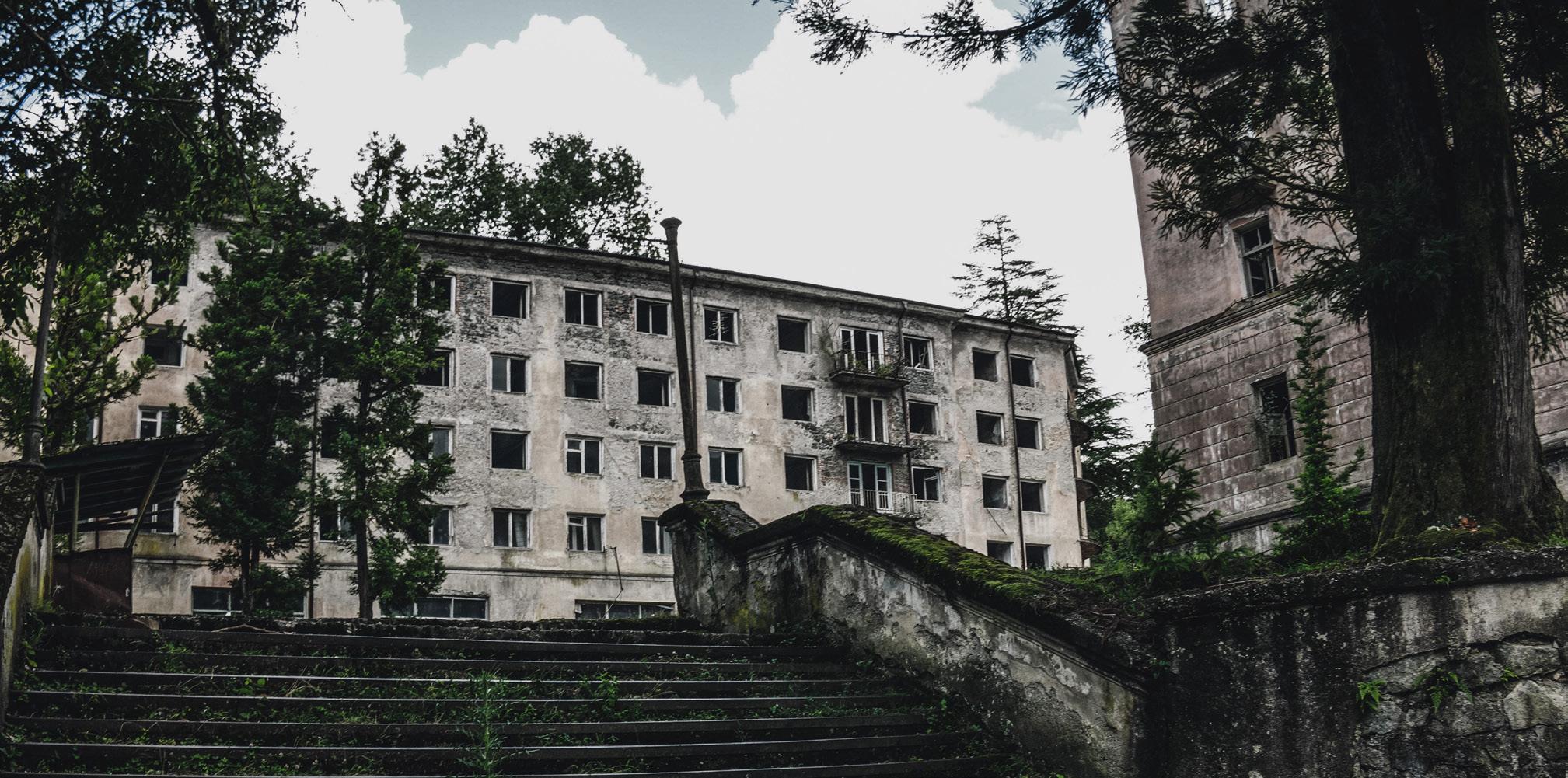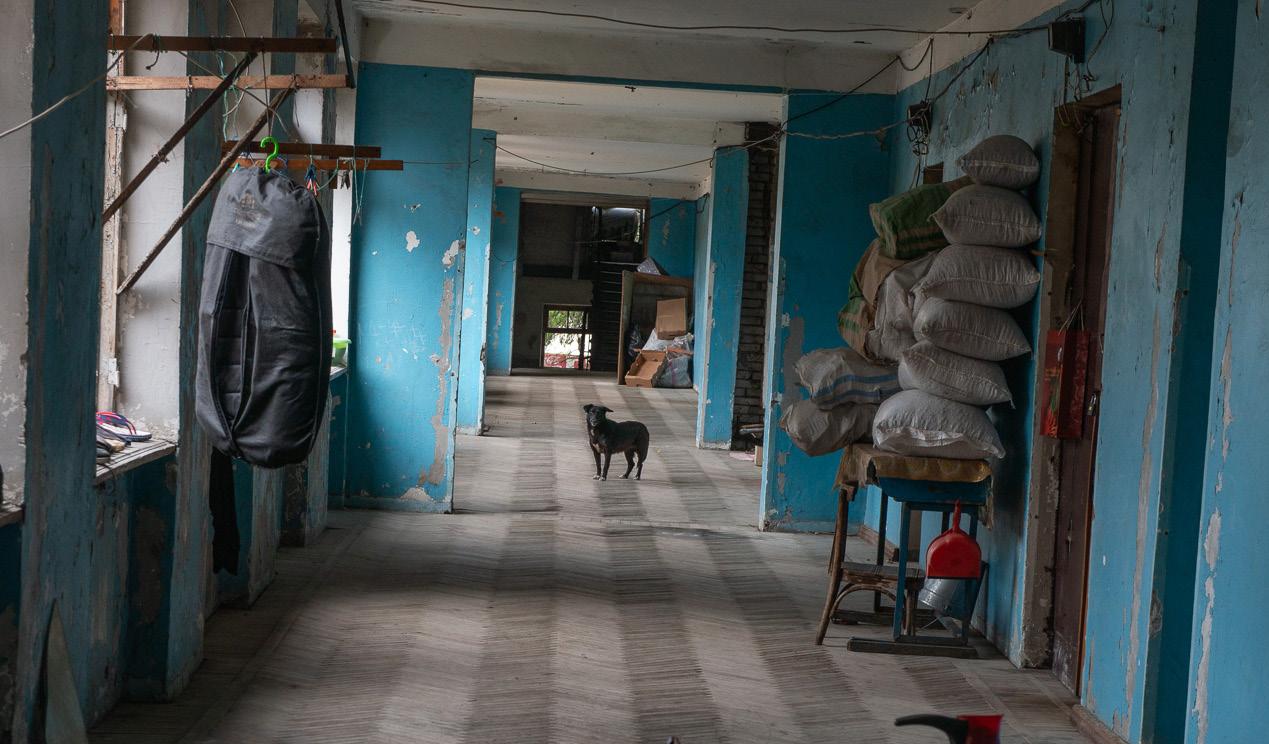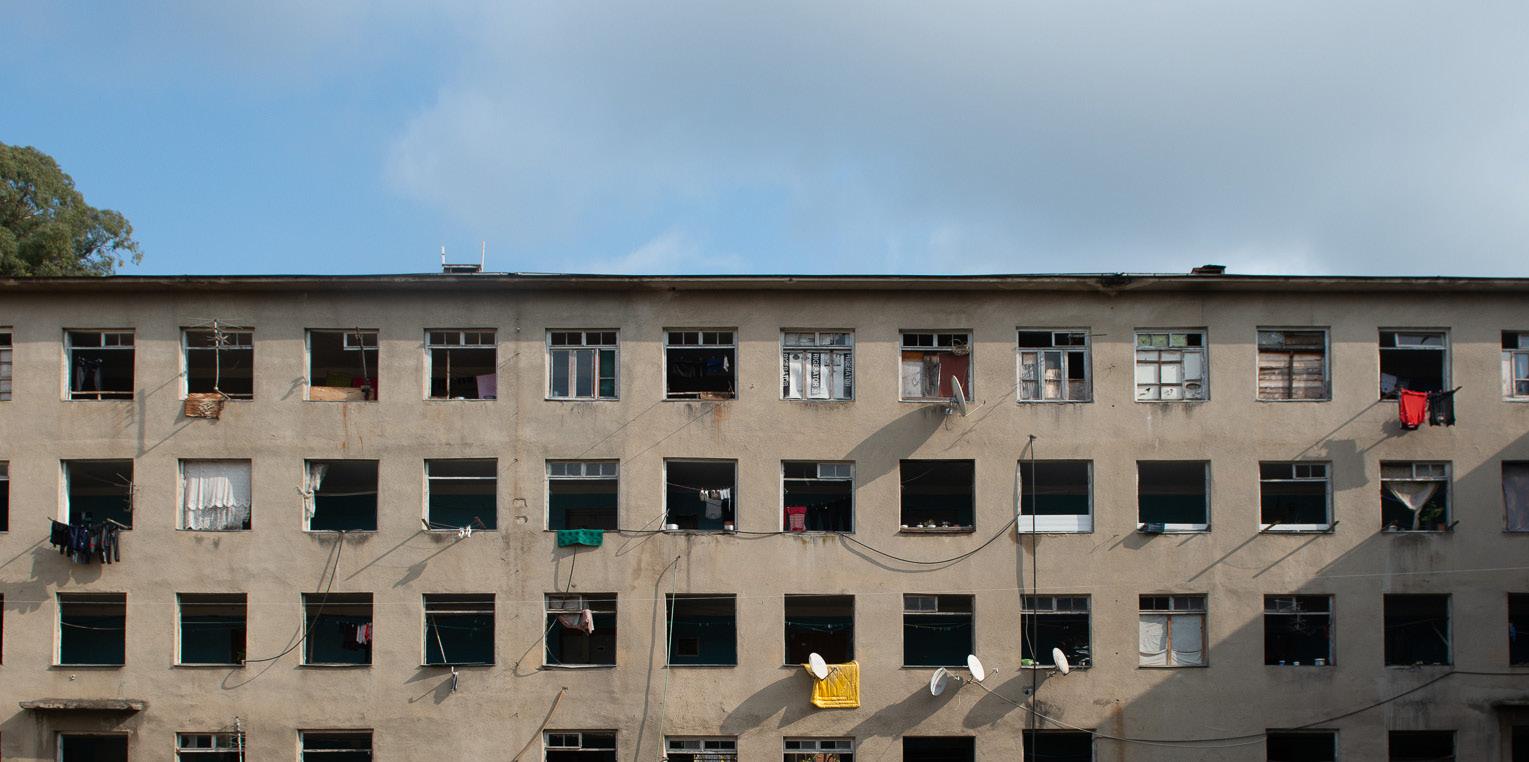
10 minute read
On Displaced and Forsaken People. Georgia’s Occupied Lands
IN ITS RECENT RULING, THE EUROPEAN COURT OF HUMAN RIGHTS FOUND RUSSIA RESPONSIBLE FOR HUMAN RIGHTS VIOLATIONS ON GEORGIA'S OCCUPIED TERRITORIES. WHILE CELEBRATING THE RULING, GEORGIANS CONTINUE TO DISREGARD THE NEEDS OF PEOPLE DISPLACED BY THE WARS AND THE CALLS FOR DIALOGUE FROM THOSE LIVING ON THE OTHER SIDE OF BARBED WIRES. THE PERSPECTIVE SPOKE TO GEORGIAN EXPERTS AND A DISPLACED PERSON FROM SOUTH OSSETIA TO GAIN INSIGHT INTO THE UNRESOLVED CONFLICTS.
On January 30, 2021, nine days after the announcement of the court’s ruling, an old building collapsed in Zugdidi, western Georgia. A 10-year-old girl was miraculously pulled alive from under the rubble. What puts her story in the spotlight is that her family—just like other residents of the building—are Internally
Advertisement
Displaced Persons (IDP) from Abkhazia. The incident is a vivid demonstration that even after three decades since the conflict in Abkhazia, the Georgian government has not fulfilled its duty to provide IDPs with safe living conditions.
As of today, there are around 270,000 IDPs in Georgia, making up approximately 7% of the country’s 3.7 million population. The majority of them became displaced in the early 1990s, as a result of an ethnopolitical confrontation in Abkhazia. The remaining IDPs fled Russia’s invasion of Georgia in 2008, a conflict due to which Georgia lost control over South Ossetia.
Since their displacement, some IDP families have been provided with housing by the government, however, around 50,000 IDP families are still waiting. Even after so many years since the conflicts, many IDP families continue living in old, uninhabitable buildings—still waiting for the Georgian government to provide them with housing.
The Georgian government exerts control over neither Abkhazia nor South Ossetia—both of which aspire to independence and are run by their respective local authorities. Despite their ambitions, these regions have not managed to gain international recognition as independent states and continue to be reliant on and heavily influenced by Russia, whose soldiers guard the checkpoints along the barbed-wire borders that divide them from Georgian-controlled territories.
Ruling of the European Court of Human Rights
The Georgian government submitted the case to the ECtHR in the immediate aftermath of the 2008 Russian-Georgian war. The ruling was announced in January 2021 and said that Russia had breached a number of articles of the European Convention of Human Rights. The court found Russia responsible for—among other wrongdoings—inhumane and degrading treatment of Georgian civilians, torture of prisoners, and looting and burning of homes. Further, the court said that “the strong Russian presence and the South Ossetian and Abkhazian authorities’ dependency on the Russian Federation indicated that there had been continued ‘effective control’ over South Ossetia and Abkhazia.” The decision of the court was widely celebrated in Georgia, as officials assured the population that the ruling would help the country regain its territorial integrity. “The court has confirmed Georgia’s claims that Tskhinvali region [South Ossetia] and Abkhazia are integral parts of Georgia and are occupied by Russia,” said Gocha Lortkipanidze, Georgia’s Justice Minister. However, amidst the country-wide celebration of the ruling, little attention was paid to the living conditions and needs of people directly affected by the war.

An abandoned building complex in Akarmara, Abkhazia, Georgia.
© Pavel Neznanov/Unsplash
The Forgotten Ones
“The court’s ruling is a valuable document indeed. Georgia has been claiming that Russia is an occupier, that it invaded Georgian territories, which now has been confirmed by the court’s ruling as well. However, when the ruling came out, nobody remembered IDPs,” Toma Sukhashvili, an IDP from South Ossetia told THE PERSPECTIVE.
After fleeing the war in 2008, Toma and his family experienced all the hardships that IDPs have gone through—from squatting state-owned buildings for shelter, to being forcefully evicted from these buildings by police.
Georgia did not have a state strategy on IDPs until 2007—and the state program on providing IDPs with homes started only in 2009. IDPs, many of whom had nowhere to go, found shelter in non-residential state properties, such as schools or hotels. However, years later the government started to gradually reclaim these buildings—mostly to boost the economy by selling them to foreign investors. As a result, some of the IDPs were offered new homes, while others were offered compensation for abandoning their temporary residencies. If they refused to leave, the government would cut them off from water and electricity supply to make the living conditions unbearable, or eventually, they were forcefully evicted by police. IDPs often resorted to extreme measures of protest, such as sewing lips or setting themselves on fire, demanding the government pay attention to their needs.
The situation started to improve somewhat after the state strategy was put in place. However, it has not resolved the problems of thousands of people still living in life-threatening conditions such as the building that collapsed in Zugdidi.
“More than half of the IDP population is still waiting to be provided with homes. The government has raised the budget for rehousing projects, but if we look at the number of people on the waiting list, it becomes clear that the current pace is still slow. With the current pace, it will take 20 more years to provide all remaining IDPs with homes,” Eliko Bendeliani from the Institute for the Study of Nationalism and Conflicts told THE PERSPECTIVE. She elaborated that even after so many years since these conflicts, the living conditions of some of the IDP families are so harsh that they could easily be compared to torture.
“Families have to live in deteriorating buildings. They are deprived of basic means of hygiene [...] In some cases, there is only one toilet on a single floor, or they don’t have indoor toilets at all. It’s unimaginable that people are living in such conditions in the 21st century,” Bendeliani explained.
Dialogue or No Dialogue
“20% of my country is occupied by Russia” is the phrase that caught on after the 2008 war, during the rule of the United National Movement party led by the former Georgian President, Mikheil Saakashvili. This is when the country’s policy towards the occupied territories started to target Russia as the only other agent in the conflict.
A Bitter Reminder of War
The current stance of the Georgian government is the continuation of this policy. It considers In the aftermath of conflicts, the government’s rhe- Abkhazian and Ossetian people as Georgian cititoric ensured IDPs that they would be returned to zens, however, at the same time, it refuses to speak their homes in no time. Now the hope of return is directly to Abkhazian and Ossetian officials, denying nothing but a distant dream. their agency in the process. The incident, such as the crumbling of the building "With the current Since 2008, the Geneva where IDPs lived, is a bitter reminder for Georgians pace, it will take 20 International Discussions— co-chaired by the EU, the of the war and the fact that the state has failed to pro- more years to provide UN and the Organization for Security and Co-operation vide its citizens with care all remaining IDPs in Europe (OSCE)—is trying and safety. Still, the issue of IDPs barely penetrated with homes." to tackle the conflict in Georgia by bringing together the mainstream narrative of representatives of Georgia, victory and a country-wide Eliko Bendeliani to THE PERSPECTIVE Russia, USA, Abkhazia and celebration on 21 January, South Ossetia. when the Strasbourg court announced the ruling. In fact, the ruling barely even raised the discus- While South Ossetia is unwilling to cooperate with sion on Georgia’s relationships with Abkhaz and Georgia beyond that format, the Abkhaz authorities Ossetian populations. have made attempts to widen the scope of dialogue with Georgia. Since the power shift in Abkhazia in “When people say 20% of Georgia is occupied by March 2020, the new Abkhazian leadership reiteRussia, it doesn’t include the concerns over the rated their will for a separate format for bilateral state of IDPs,” said Toma Sukhashvili. talks with Georgian officials.
He believes that for the most part, the phrase has gained a narrow connotation that Russia has taken Georgian territories. He elaborated that the Abkhaz and Ossetian people who live on these territories shouldn't be forgotten. “There could be a different format for negotiations and contacts... It could be something not as distant as Geneva, but something on the border, for resolution of this kind of [border-related] issues,” said Aslan Bzhania, Abkhazia’s newly elected President in March 2020.
Other calls suggested cooperation in the fields of economy, trade, energy and transportation—however, they were dismissed. At the time, the Georgian government was preoccupied with upcoming parliamentary elections and none of these calls were answered—not even months after Georgian Dream, the country’s ruling party, took office for the third term. Now the Georgian leadership is preoccupied with political rivalry with its opponents, missing the window of opportunity to rebuild relationships.
Fearing the Russian Narrative
In the meantime, Georgians are constantly reminded of the presence of Russian soldiers nearby. Georgian nationals living near the borderline are often taken and arrested by Russian soldiers under false charges of illegal border crossing. According to a report of the Georgian State Security Service, in 2018 alone, more than a hundred Georgian nationals were arrested on such charges.
Some of such arrests resulted in fatal endings. In 2018, a Georgian citizen and a former soldier Archil Tatunashvili died in custody in South Ossetia after being arrested on the charges of being an informant for the Georgian special services. South Ossetian authorities had claimed he had “fallen down from stairs,” while Georgian autopsy found that he had suffered over 100 separate injuries before dying. Georgia holds Russia accountable for these crimes, which has been denying its agency in the conflict, encouraging Georgians to speak with Abkhazians and Ossetians directly. Paata Zakareishvili, Georgia's former State Minister for Reconciliation and Civil Equality believes that the reason behind the Georgian leadership’s refusal to engage in a direct dialogue is the fear that they will strengthen the Russian narrative. He told THE PERSPECTIVE that Georgia “has become the hostage of its own concept.”
“When we had formal and informal meetings abroad with Abkhazians and Ossetians, I know that their representatives were questioned by Russians upon return. [...] Russians want there to be only Geneva talks because they can observe the situation. Because of Russia’s presence, Abkhazians and Ossetians aren’t able to openly express themselves,” Zakareishvili elaborated, encouraging Georgian officials to develop separate channels of communication with Abkhazia and South Ossetia.

Long corridors such as this one are typical in residences of IDPs in Georgia. This building in Zugdidi, Western Georgia, was never designed as a residential building, however, families have been living in it for decades now.
© Tamuna Chkareuli

A residence of Internally Displaced Persons in Zugdidi, Western Georgia. Residents of this building have no drinking water or individual toilets.
© Tamuna Chkareuli
Estrangement—a Possibility
So far, besides Russia, only a limited number of countries have acknowledged Abkhazia and South Ossetia as independent states. Georgia enjoys the support of its territorial integrity from its western partners—the EU and the US. Because of this, both Abkhazia and South Ossetia have found themselves in isolation, as they refuse to cooperate with the EU if the partnership is managed through Tbilisi—the seat of the Georgian government. This has allowed Russia to strengthen its influence in these isolated regions. Paata Zakareishvili believes that Georgia’s refusal to engage in a dialogue with these regions contributes to the increase of Russia’s influence over them. for informal dialogue and cooperation of mutual interest with Abkhazian and Ossetian societies.” Her use of the words “informal dialogue” may suggest that the ministry has no concrete plans in terms of revising its current policy of cooperation with these regions.
When Russian Soldiers Leave
Toma Sukhashvili, an IDP from South Ossetia believes that “Georgians should try to see real people beyond the terms such as Abkhazian and Ossetian society.” In his view, Abkhazians and Ossetians are currently seen by Georgians only as puppets operated by Russia, incapable of making their own judgments.
“The ruling of the Strasbourg court is a proof that Georgia is occupied—however, it will not resolve the conflict. Europe cannot resolve our conflicts. The government should be smart enough not to allow estrangement with Abkhaz and Ossetian communities,” said Zakareishvili, adding that Georgian officials should “let Brussels work directly with these regions.”
On 21 February Tea Akhvlediani, the acting State Minister for Reconciliation and Civil Equality, stated that Georgia is ready to “broaden the platform “This illusion will fade when Russian soldiers leave and Georgians find out that they have a problem with Abkhazian and Ossetian people, whose existence was not acknowledged, who were not spoken to. In our consciousness there are no societies, there are only territories,” concludes Sukhashvili.
Disclaimer: For ease of reading, we decided not to use qualifiers such as de facto regimes. Lack of such terminology does not imply our stance on the status of the regions mentioned in the article.
DATO PARULAVA










